Over the last couple of years, it seems that GTO Poker, which stands for “game theory optimal,” has been one of the most popular terms in the game.
Yet, few poker players actually know what GTO poker really is, how to play it, or even how to describe it properly.
Those who do understand the fundamentals of poker GTO play often mistake that for being able to play a game theory optimal poker strategy, which in most cases, isn’t true.
In this article, we will try to explain the concept of GTO poker in a way that can be understood by most poker players, along with the differences between GTO poker and exploitative play and examples of what makes each strategy better than the other.
By the time you are done reading, you should be able to understand the most basic GTO poker concepts, allowing you to start studying it in a more methodical way.
What Is GTO Poker?
GTO Poker (game theory optimal poker) is a style of playing poker that is based entirely on mathematics and is designed to make your plays unexploitable.
Playing a GTO strategy means making different moves at the right frequencies to always make them profitable, or at least break even, regardless of your opponents’ actions.
When faced with another perfect GTO player, the GTO strategy would break even. In all other cases, the GTO strategy would make a profit.
However, a complete GTO poker strategy has not yet been discovered, as there are too many variables in the game of poker to create such a strategy.
What’s even more, it is entirely impossible for humans to play GTO poker in real-time without using the assistance of computers, which is why an approximation of a GTO strategy is the best we can do.
Yet, studying poker with solvers (a GTO poker simulation tool) is one of the best ways to learn how to play and how to think about the game in terms of ranges, frequencies, and balance.
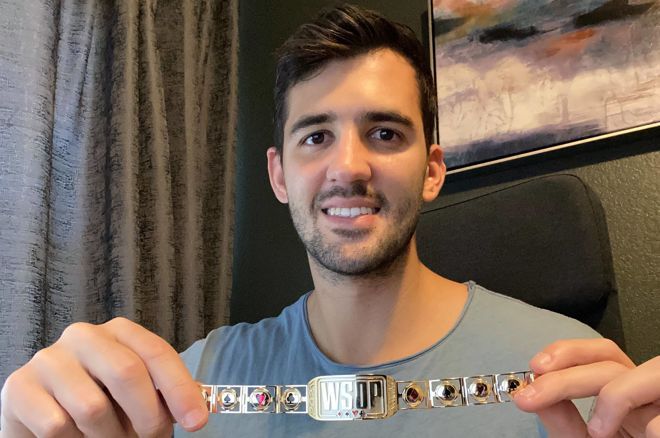
One of the best poker players in the world under the age of 30,
PokerCoaching.com coach Justin Saliba has built a career off of playing a GTO poker strategy.
How GTO Poker Differs from Exploitative Poker
As we just explained, GTO poker focuses on making our game unexploitable and making sure that we are perfectly balanced at all times.
Exploitative poker, on the other hand, focuses on exploiting the mistakes of our opponents, thus unbalancing our ranges at the expense of capitalizing on the mistakes of others.
While exploitative play stands to gain more when big leaks are spotted in our opponent’s game, it also stands to make us exploitable and crushed if our opponents can spot our leaks.
By playing an approximation of a GTO poker strategy, we are able to always play poker the same way and continue to print money, especially in heads-up poker situations.
On the other hand, when faced with a particularly weak opposition, switching over to an exploitative style of poker will usually result in a higher win rate, provided we don’t make big mistakes that will end up costing us dearly in return.
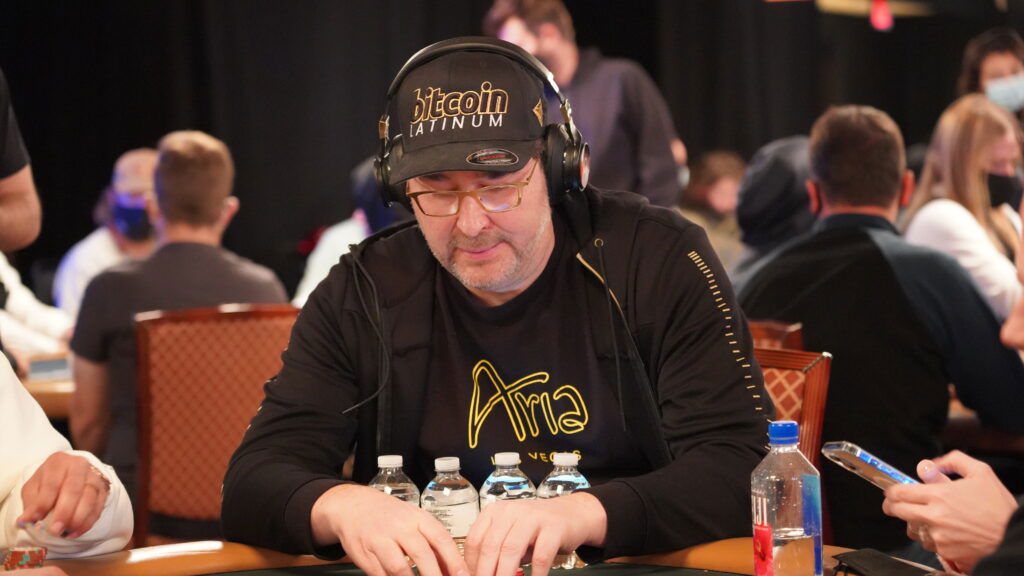
While old school legends like Phil Hellmuth built careers off of
playing exploitative poker, in the modern era GTO is needed to beat the best.
Poker Solvers – GTO Tools You Will Need
Before you can really start exploring the world of GTO poker, you will need to learn about poker solvers and their use. Simply put, poker solvers are tools used to simulate the GTO poker strategy, with the likes of PioSolver and PokerSnowie being some of the most popular tools of this sort.
Poker solvers are able to calculate the exact way in which you should play the different hands in your range based on a variety of inputs you provide them with.
For example, if you provide a poker solver with your starting hands range, the preflop action, and stack sizes of the players involved in the pot, as well as the flop that was dealt out, it will provide you with a full rundown of all the hands with which you should check or make bets of different sizes.
You can view poker solvers as training tools that will help you understand GTO poker strategy more profoundly and eventually lead you to start instinctively making plays that resemble Game Theory Optimal way.
That said, it is important to note that the use of poker solvers while playing poker is forbidden in both online poker and live games and that these tools only exist to help you study the game while away from the tables.
Key Poker GTO Concepts
Unlike an exploitative poker strategy, the kind that you will often see employed by “old school” poker players, GTO strategy deals with slightly different concepts.
To be able to explore poker GTO play further, you will need to understand a few basic GTO poker terms, such as hand ranges, frequencies, and minimum defense frequency.
So, let’s explain those briefly so you can get started with looking into GTO poker yourself a little more deeply.
Poker Hand Ranges
The concept of hand ranges in poker is one that’s become very standardized these days and is used by both GTO and exploitative poker players.
A hand range is a collection of all hands that you or your opponent can have in a given situation when all previous action is taken into consideration.
Poker solvers can be used to determine optimal preflop hand ranges for various stack depths and positions, and this hand range is then shrunk down with each new action being made.
Whenever you analyze poker hands with a solver, you will always be presented with solutions as to what to do with different parts of your range.
As you adopt the strategy, you will learn to always think about both your and your opponent’s hands in terms of ranges rather than two specific cards.
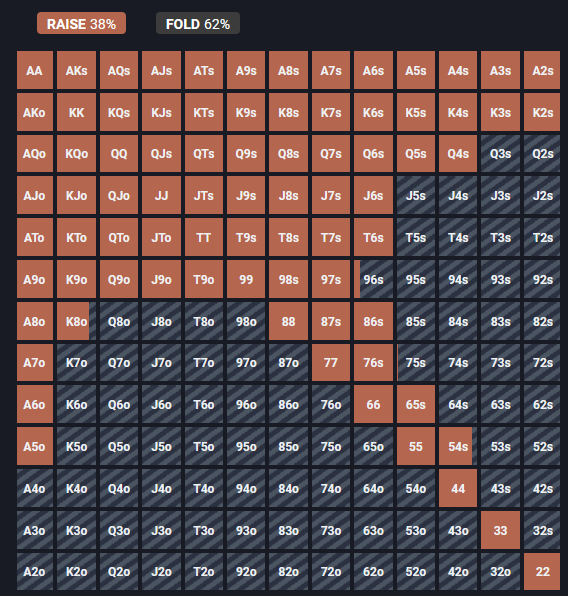
Preflop charts like the one shown above can help you play a proper GTO strategy.
Action Frequencies
While most novice poker players think about making certain plays in terms of either making them or not, poker solvers “think” differently and often present you with a mixed strategy that is made up of distinct actions, each to be made at a different frequency.
For instance, facing a preflop re-raise, the solver might suggest that you fold your hand 70% of the time and 4-bet it the remaining 30% of the time.
While this may seem counterintuitive, especially when the call option is not even mentioned, there is a method to this line of thinking.
The solver may decide to incorporate a hand that is not worth making a call with into your bluffing range at a certain frequency, all in order to remain balanced and unexploitable.
The truth is that thinking about poker plays in terms of frequencies will take a lot of getting used to, and only working with solvers for an extended period of time will help you actually get there in full.
Minimum Defense Frequency (MDF)
One of the most commonly heard but also most commonly misunderstood GTO poker concepts is minimum defense frequency (MDF).
MDF refers to the minimum percentage of hands in your hand range that you should continue with (by either calling or raising) when facing a bet from your opponent.
Calculating MDF is fairly simple in theory, although coming up with the exact portion of your range you should continue while playing is too big of a challenge in most situations. Yet, working with MDF calculations while studying poker will help you quickly come up with close approximations while playing, helping you make the right decisions at the table.
Minimum defense frequency is calculated using this simple formula:
MDF = Pot Size / (Pot Size + Bet Size)
While you can calculate the MDF using this formula, you can also use the table below to quickly figure out what percentage of your hands you should continue with facing some standard bet sizes:
| BET SIZE | MINIMUM DEFENZE FREQUENCY |
| Full Pot | 50% |
| 3/4 Pot | 57% |
| 2/3 Pot | 60% |
| Half Pot | 67% |
| 1/3 Pot | 75% |
Once you have the percentage of hands you should continue with calculated, the real trick will be to determine which hands to fold and which to continue with.
Solvers do an excellent job of identifying the perfect hands to call and raise with, based on backdoor equity, your ability to continue bluffing on the turn, as well as blockers and unblockers.
All these concepts are something you will learn more about as you study solver outputs, with every new hand you analyze teaching you the logic behind the GTO poker strategy.
Balancing Your Ranges
Playing GTO poker is all about finding balance in every possible situation, which means finding hands to bluff with and to value bet within your range on every board.
This can be extremely difficult to do in Texas Hold’em, as our instincts often tell us that certain boards are not great to bluff at or that we should check out value hands more often than we really should.
Thankfully, solvers are there to help us shed these fears and make the right decisions, which is why studying different board textures with solvers is so important.
Remember that solvers will always look to find balance by finding the right hands to bluff and the equivalent number of hands to value bet with, depending on the bet sizes you instruct it to use.
Players who strive to mimic solver strategies are always talking about balancing out their range, and while it may seem like they are taking it too far, there is certainly good logic behind their thinking.
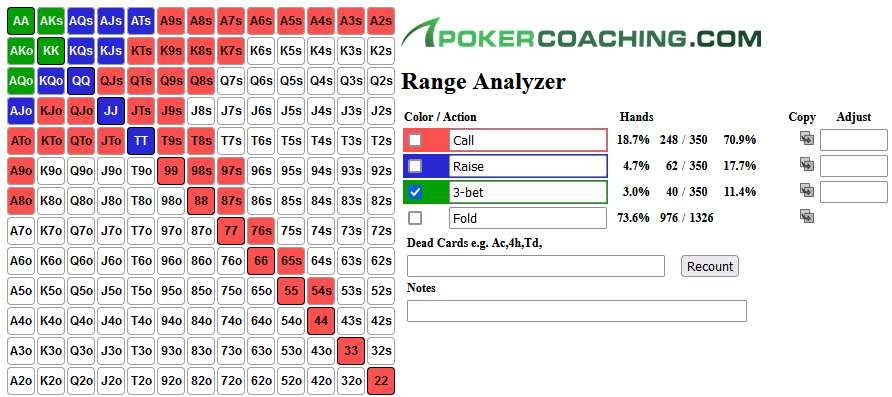
Tools like the FREE Range Analyzer on PokerCoaching.com
can help you better study poker ranges.
Is GTO Poker the Best Poker Strategy?
There is a lot of debate these days on whether GTO poker is the way to go or if exploitative poker strategy still reigns supreme.
The truth is that there are times when poker GTO strategy is the best, as your opponents are simply too good, and playing exploitatively against them leaves you very vulnerable to being exploited yourself. You should apply the GTO strategy when:
- You are playing against a strong opponent that does not make many mistakes
- You are playing against an unknown player and have not identified any possible exploits
On the other hand, playing against weaker opposition, exploitative plays often result in higher gains and better net results, making an exploitative strategy superior.
At the end of the day, whichever way you choose to go in a given game, understanding the GTO baselines will allow you to make better exploitative deviations and will allow you to play against just about anyone without being run over.
Final Words on GTO Poker
Despite GTO poker being one of the most thrown-around terms these days, it is important to remember that humans can’t really play the GTO strategy to perfection and that everything you have ever seen employed in-game was just an approximation at best.
Yet, studying poker using GTO-based solvers will allow you to start looking at the game from a different perspective and build strong fundamentals that will make you extremely difficult to beat.
Whether you are looking to play against the very best players out there or dominate your local home game, exploring the world of GTO poker will help you become a better player and compete at a higher level.
Start your GTO poker journey today, fire up the solver, and run your first-hand analysis to see just how deep the rabbit hole really goes.
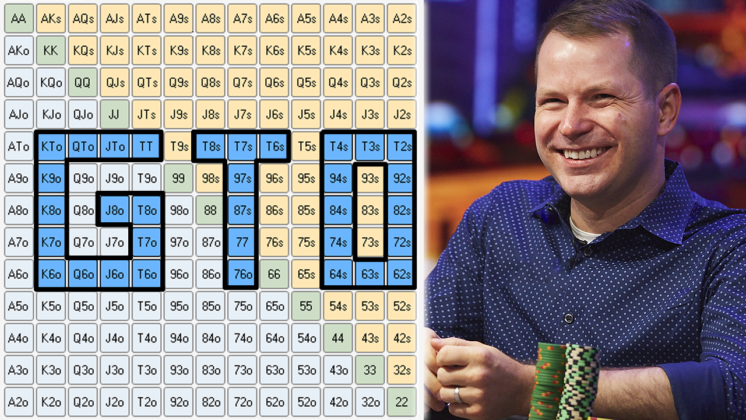
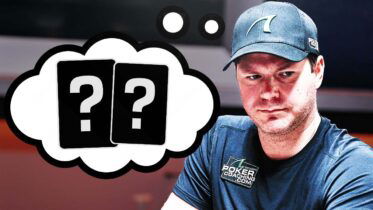
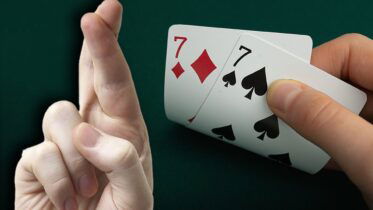

Pingback: URL
Pingback: Biggest Poker Tournaments to Play in 2024